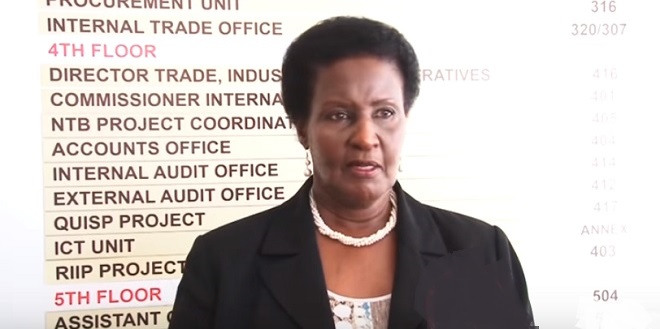
Chinese Business Community living in fear of being chased out of Uganda
Trade Minister Amelia Kyambadde has asked Chinese doing business in Uganda to stop engaging in petty trade to avoid causing hostility among locals. Some Ugandan have for long complained about foreign petty traders depriving them of work.
Kyambadde me members of the Uganda Chinese Business Association at the Ministry offices to address the challenge of the influx of foreign petty traders. The minister cautioned the Chinese to adhere to the Ugandan laws if they want to do business in the country.
“If you register with Uganda Investment Authority as a wholesaler, you should remain as a wholesaler and not go into petty business”, warned Kyambadde in the Thursday meeting.
Kyambadde advised the Chinese who were led by Zhao Xiuten, the Councilor at the Chinese Embassay in Kampala, to instead venture into manufacturing and add value to agricultural products like coffee and fruits, and minerals like iron ore, limestone and others where Uganda has a comparative advantage.
She also advised them to invest in construction of warehouses and cold storage facilities where there is a very big shortage.
Chinese complain about harassment, poor business environment
However, the Chinese challenged the minister, saying manufacturing in Uganda has a number of concerns and challenges especially the insufficient raw materials, lack of skilled manpower which forces most foreign investors to import skilled labour from developed countries.
Sherry Shi, a supplier of electrical from Electrical Excellence Ltd in Nakasero, Kampala says Uganda’s investment environment is not conducive for the local manufacturer with a very unfriendly tax regime and unfair competition from sub standard products on the market.
“The competition we are facing from sub standards products on the Ugandan market is pushing some of us out of business. We produce so much but we are not selling because of the cheap sub standard goods,” said Sherry.
Sherry Shi says they have raised a number of complaints to Uganda National Bureau of Standards but no help has been received.
Peng Weixue Antonio from Accelerator Investment Ltd based in Kenya said manufacturing is a gradual process and thus they need time to grow their businesses so that in the long run they can be able to venture into huge capital investments like manufacturing.
“Rome was not built in one day. Most developed countries like China started with trading and after accumulating enough capital they started manufacturing,” said Peng.
The Chinese Business Community also decried the negative propaganda in the media saying they are living in fear of being thrown out of Uganda. Dr. Jeff Lin, the Secretary General of Uganda Chinese Business Association told the minister that messages are spreading especially on the social media purporting an imminent expulsion of foreign traders from Uganda.
However, the minister assured them that no one is going to throw them out and government is yet to come out with an official statement to clarify on the matter. She said it is the role of government to protect all investors both local and foreign.
Kyambadde rubbished the threats of throwing foreign petty traders and said government will use good means of resolving the problem.
The Ugandan Business Community has for long complained about the influx of foreigners in petty trade dominating the entire distribution chain of commerce through engaging in Manufacturing, Wholesaling, Retailing and Hawking among others.
An exercise carried out by the Department of Internal Trade in the Ministry of Trade, Industry and Cooperatives to take stock of all foreigners involved in trade in Uganda showed that out of the 886 foreign owned enterprises that were cleared for a trading license in Kampala during the period of the exercise (November 2012 to 31st December 2015), 13.77% were Chinese owned while 46.50% were Indian owned. Together these two nationalities account for 60.27%.
 The Independent Uganda: You get the Truth we Pay the Price
The Independent Uganda: You get the Truth we Pay the Price



